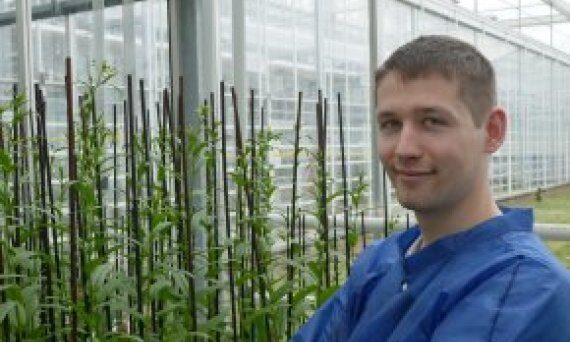However, the oil from the gold-of-pleasure plant, a plant indigenous to the Netherlands, can also be used. PhD candidate Jarst van Belle bred a gold-of-pleasure variety with the correct concentration of fatty acids.
The gold-of-pleasure is a common plant that occurs naturally in the Netherlands. The plant, officially know as Camelina sativa, is similar to rapeseed both in appearance as in its oil-rich seeds. In the past, the plant was used in lamp oil and as a lubricant. PhD candidate Jarst van Belle used breeding experiments to demonstrate that the oil content of the plant could be significantly improved. This may allow the gold-of-pleasure to compete with the palm oil currently used in soaps.
Oil profile
Van Belle focussed on the constitution of the oil profile of the seeds. Using CRISPR/Cas9, he managed to increase the amount of medium length fatty acids chains (MCFA) and monosaturated fatty acids (MUFA). These fatty acids are used as raw materials in bio-based products such as plastics, lubricants and as building blocks for polymers. European producers currently import these fatty acids in the form of palm kernels and coconut oil from countries in tropical regions. The EU strives to decrease its dependence on these imported products and funded the Cosmos project to find alternatives. The Food and Biobased Research group within WUR coordinated the project and researched the camelina.
Genes
Van Belle aimed to use the entire plant. Both the oil from the kernels, and the proteins from the rest of the plant. The camelina produces many unsaturated fatty acids. But that is precisely what the PhD student did not want. Using CRISPR/Cas9, he managed to disable three different genes in the plant, thereby reducing the percentage of these unfavourable fatty acids from 53 per cent to 5 per cent, and, at the same time, significantly increasing the amount of useful fatty acids. Additionally, he used CRISPR/Cas to disable the production of a flavouring agent in the plant, making the proteins it yields more suited to processing in animal feed.
Shampoos
The oils of the gold-of-pleasure are primarily used for industrial purposes, says Robert van Loo, Van Belle’s co-supervisor. A French company that participated in the EU-project cuts the fatty acids obtained from the camelia into two parts. The short-chain fatty acids that are currently obtained from palm oil can be used to produce soaps and shampoos. The longer amino acids can be used in products such as stockings. The plant may also serve as a raw material for the aircraft fuel kerosine. In all these cases, the production process cannot yet compete with the processing of imported oil.
Marginal farmlands
However, this may well change, says Van Loo. In Canada, the camelina is cultivated on approximately 10,000 hectares as an ingredient for fish and cattle feed. As part of his PhD, Van Belle worked for the Canadian Linnaeus Plant Sciences company, that breeds this crop. He feels that the plant, which can handle dry conditions well, can easily be cultivated on marginal farmlands in Southern Europe. However, this requires the biobased production chain for camelina to be operational.
Tinker
‘Being able to tinker with the oil production process in this plant is fascinating’, Van Belle says. ‘Ideally, we would like to have as much of the oil we need as possible, and as little of the other oils. Thus, the processing will become more efficient and cheaper.’
The question remains whether European farmers could be the first to start cultivating the gold-of-pleasure. Van Belle needed CRISPR/Cas9 to disable several genes in a timespan of a few months. This process would have required years of breeding and selection using the traditional method. As long as CRISPR/Cas falls under the EU GMO-approval regime, the first cultivation of this biobased plant is likely to take place outside of Europe.
Jarst van Belle obtained his PhD – though Skype- under plant breeding professor Richard Visser on 24 March.

 Photo: Jarst van Belle
Photo: Jarst van Belle 

